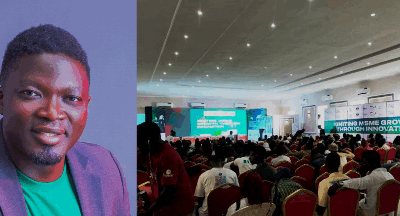John Nwachukwu, the Chief Strategy and Executive Officer (CSEO) at Zoracom, emphasizes the vast potential of digital transformation for Nigerian businesses in a recent interview with IT Edge News. He highlights how such transformation can spur innovation, bolster competitiveness, and open doors to new growth avenues. However, Nwachukwu acknowledges the hurdles on this journey, citing technological barriers, cybersecurity risks, cultural resistance, and resource limitations as key challenges. Despite these obstacles, he expresses confidence that with Zoracom’s guidance and support, Nigerian businesses can confidently navigate the digital landscape, fostering resilience and paving the way for future growth and prosperity.
As a leading provider of cybersecurity solutions in Nigeria, how do you assess the current state of cybersecurity adoption in the country, and what are the key challenges that organizations face in this regard?
In Nigeria, cybersecurity adoption demonstrates advancement alongside persistent gaps. While awareness of threats rise, implementation remains inconsistent. Organisations require enhanced resources and awareness to effectively counter evolving cyber risks, including challenges such as limited awareness, regulatory non-compliance, resource constraints, sophisticated threat landscapes, and infrastructure limitations.
Digital transformation is a buzzword in today’s business landscape. What are some of the most significant challenges that Nigerian businesses encounter when undergoing digital transformation, and how does Zoracom assist them in overcoming these challenges?
One of the foremost challenges that Nigerian businesses encounter during digital transformation is the lack of adequate technological infrastructure and resources. Many organizations in Nigeria struggle with outdated IT systems, limited internet connectivity, and insufficient technical expertise, which hinders their ability to adopt and leverage cutting-edge digital technologies effectively. Zoracom addresses this challenge by offering comprehensive infrastructure management solutions tailored to the unique needs and constraints of Nigerian businesses.
RELATED: Zoracom® pushes ahead 10 years of innovation in Nigeria’s tech sector
From network optimization and cloud migration to IT asset management and remote monitoring, Zoracom’s solutions empower organizations to modernize their infrastructure, enhance operational efficiency, and lay a robust foundation for digital transformation.
Another significant challenge for Nigerian businesses embarking on digital transformation is cybersecurity threats and data privacy concerns. As organizations digitize their operations and embrace cloud computing, IoT, and mobile technologies, they become increasingly vulnerable to cyberattacks, data breaches, and regulatory compliance risks. Zoracom specializes in cybersecurity solutions that provide end-to-end protection against evolving cyber threats, safeguard sensitive data, and ensure compliance with relevant regulations such as the Nigeria Data Protection Regulation (NDPR).
Through a combination of advanced threat detection, proactive risk mitigation, and comprehensive security awareness training, Zoracom empowers Nigerian businesses to navigate the complex cybersecurity landscape with confidence and resilience.
Another significant challenge for Nigerian businesses embarking on digital transformation is cybersecurity threats and data privacy concerns. As organizations digitize their operations and embrace cloud computing, IoT, and mobile technologies, they become increasingly vulnerable to cyberattacks, data breaches, and regulatory compliance risks.
Cultural resistance and organizational change management represent additional hurdles that Nigerian businesses must overcome during digital transformation. Traditional mindsets, resistance to change, and siloed organizational structures can impede the adoption of new technologies and inhibit collaboration across departments.
Zoracom recognizes the importance of change management in successful digital transformation initiatives and offers tailored consulting services to help organizations foster a culture of innovation, collaboration, and agility. By conducting organizational assessments, stakeholder engagements, and training workshops, Zoracom equips Nigerian businesses with the knowledge, skills, and tools needed to navigate cultural barriers, drive adoption of digital technologies, and achieve sustainable transformational change.
Lastly, limited access to affordable financing and technical expertise poses a significant challenge for Nigerian businesses seeking to embark on digital transformation initiatives. Zoracom collaborates with government agencies, financial institutions, and industry associations to promote digital inclusion and facilitate access to funding, training, and capacity-building programs for SMEs and startups. Through partnerships with local universities, vocational training centres, and technology incubators, Zoracom helps bridge the digital skills gap in Nigeria by offering internship opportunities, mentorship programs, and scholarships to aspiring IT professionals and entrepreneurs.
Digital transformation holds immense promise for Nigerian businesses to drive innovation, enhance competitiveness, and unlock new growth opportunities. However, realizing these benefits require overcoming various challenges, including technological barriers, cybersecurity threats, cultural resistance, and resource constraints. Zoracom stands as a trusted partner for Nigerian businesses embarking on their digital transformation journey, offering tailored solutions, expert guidance, and strategic partnerships to navigate challenges, mitigate risks, and achieve sustainable success in the digital age. With Zoracom’s support, Nigerian businesses can embrace digital transformation with confidence, resilience, and a clear path to future growth and prosperity.
Co-location and infrastructure sharing are vital components of modern IT infrastructure. How do you envision the future of co-location and infrastructure sharing services in Nigeria, especially considering the emergence of new technologies like 5G and edge computing?
The future of co-location and infrastructure sharing services in Nigeria is poised for significant growth and evolution, particularly with the emergence of new technologies such as 5G and edge computing. Here’s how I envision these trends shaping the landscape:
- Increased Demand for Data Centre Services: With the proliferation of digital services, cloud computing, and data-intensive applications, there will be a growing demand for data centre services in Nigeria. Co-location facilities, which provide shared infrastructure and resources, will play a crucial role in meeting this demand by offering cost-effective and scalable solutions for businesses of all sizes.
- Acceleration of 5G Deployment: The rollout of 5G networks in Nigeria will drive the need for edge data centres located closer to end-users to reduce latency and improve network performance. Co-location providers will leverage their existing infrastructure to deploy edge data centres, enabling faster and more reliable connectivity for applications such as IoT, augmented reality, and autonomous vehicles.
- Edge Computing Adoption: Edge computing, which involves processing data closer to the source of generation, will gain momentum in Nigeria as businesses seek to analyse and act on data in real-time. Co-location facilities will become key enablers of edge computing by hosting edge servers, storage, and networking equipment in proximity to where data is generated, processed, and consumed.
- Diversification of Services: Co-location providers in Nigeria will expand their service offerings beyond traditional hosting and storage to include value-added services such as managed security, disaster recovery, and hybrid cloud integration. This diversification will cater to the evolving needs of businesses looking to outsource IT infrastructure while maintaining control and flexibility.





























